You're using an outdated version of Internet Explorer.
DOWNLOAD NOWThe Indira Gandhi Prize for Peace, Disarmament and Development consists of an award of Rs.10 million and a trophy with a citation. The trophy is a square piece of banded Haematite Jasper, the same stone which is used at the samadhi of Indira Gandhi at Shakti Sthala, New Delhi. Haematite Jasper is one of the hardest varieties of stone found in India and is estimated to be 2000 million years old.
Inset into the stone rimmed in silver is a portrait of Indira Gandhi. It is painted in the Jaipur miniature tradition by master craftsman Babulal Marotia. The words Indira Gandhi Puraskar in the Devanagri script are inset below. The trophy is encased in a rosewood box edged in silver.
Indira Gandhi's dedicated work for India and the world has earned for her a shining place in history. She lived and laboured for enlarging freedom for humankind, freedom from want, freedom from fear and freedom from various forms of prejudice and narrowness. She believed that nations could prosper only if they lived in harmony with one another. She had a unified view of humanity. She wanted men and women of all lands to live in a sense of togetherness, cherishing and enriching the universal heritage. As chairperson of the Non-Aligned Movement she declared: "Born of the universe, we cannot narrow our loyalties. Belonging to humankind, nothing human can be alien to us."
Indira Gandhi was indefatigable in alerting the collective consciousness of humanity to the dangers of confrontation in a world bristling with nuclear weapons. She was a passionate champion of disarmament and peaceful resolution of disputes. She worked for harnessing the spiritual and material resources of humankind to fight against aggression and acquisitiveness, poverty and pollution. She wanted knowledge to lead to wisdom and to inner harmony.
Like Jawaharlal Nehru, she was untiring in underscoring the indispensability of non-violence. She wanted human beings to live in peace within themselves, with fellow beings and with the rest of nature.
Clear and unshakeable in her objectives yet practical, strong yet full of compassion, committed yet detached, deeply spiritual yet secular and free from a narrow, constricted view of life, proud of her national heritage yet imbued with an international vision transcending regional and parochial considerations, Indira Gandhi carved out a niche for herself in history.
To commemorate Indira Gandhi's outstanding contribution to national and global well-being and to promote the causes which she espoused, India in 1985 instituted the INDIRA GANDHI PRIZE for Peace, Disarmament and Development. It is administered by the Indira Gandhi Memorial Trust.
The Prize shall be awarded annually to a person or organization without any distinction of nationality, race or religion, in recognition of creative efforts towards:
The Prize shall be of the value of Rs. 10 million or its equivalent in foreign exchange.
Scrutiny of proposals and final selection for the Prize shall be made by a jury of eminent persons.
The jury shall consist of not fewer than five and not more than nine members named by the Chairperson of the Indira Gandhi Memorial Trust with one of them being designated as its Chairman.
Recommendations for the Prize may be submitted by:
Each year, the Indira Gandhi Memorial Trust shall invite recommendations for the award in respect of the preceding year. The last date for receipt of recommendations shall be 30 September. The Prize shall be announced on or before 31 December.
The jury for the INDIRA GANDHI PRIZE for Peace, Disarmament and Development consists of the following eminent persons:
Shri Shivshankar Menon (Chairman)
Former National Security Advisor
Dr. Manmohan Singh
Former Prime Minister
Shri Raghuram Rajan
Professor, University of Chicago
Dr. Syeda Hameed
Former Member of the Planning Commission
Shri Wajahat Habibullah
Former Chief Information Commissioner of India
Shri Suman Dubey
Former Editor Indian Express
Ms. Aruna Roy
Social Activist
Prof. Kaushik Basu
Former Chief Economic Adviser
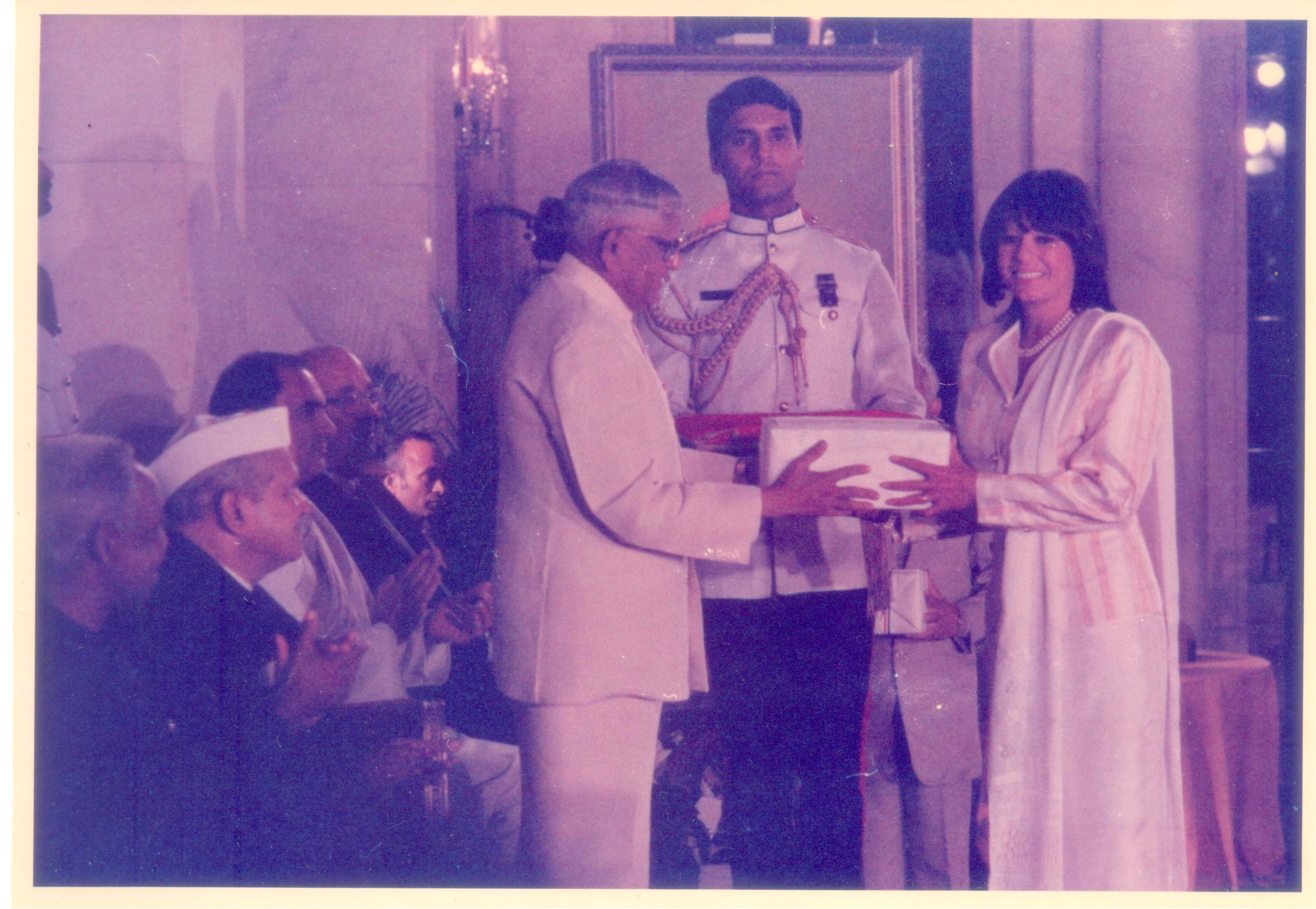
The 1986 Indira Gandhi Prize was awarded to Parliamentarians for Global Action "in recognition of their dedicated, dynamic and tenacious espousal of nuclear disarmament, their imaginative efforts to mobilize parliamentary and popular opinion all over the world on behalf of peace, development and international co-operation and their role in sponsoring the Six-Nation Five-Continent Initiative for Disarmament."

The 1987 Indira Gandhi Prize was awarded to His Excellency Mikhai S. Gorbachev, General Secretary of the Communist Party of the Soviet Union "in recognition of his bold and imaginative proposals to initiate a positive and practical process of nuclear disarmament and his vision of a non-violent world free of nuclear weapons."
The 1988 Indira Gandhi Prize was awarded to Her Excellency Gro Harlem Brundtland, Prime Minister of Norway "for her dedicated endeavours to improve the living conditions of people on this planet, especially her work, as chairperson of the World Commission on Environment and Development, to focus international attention on the close interdependence between economic development and environmenal conservation and the heed to convert our one earth into one world."
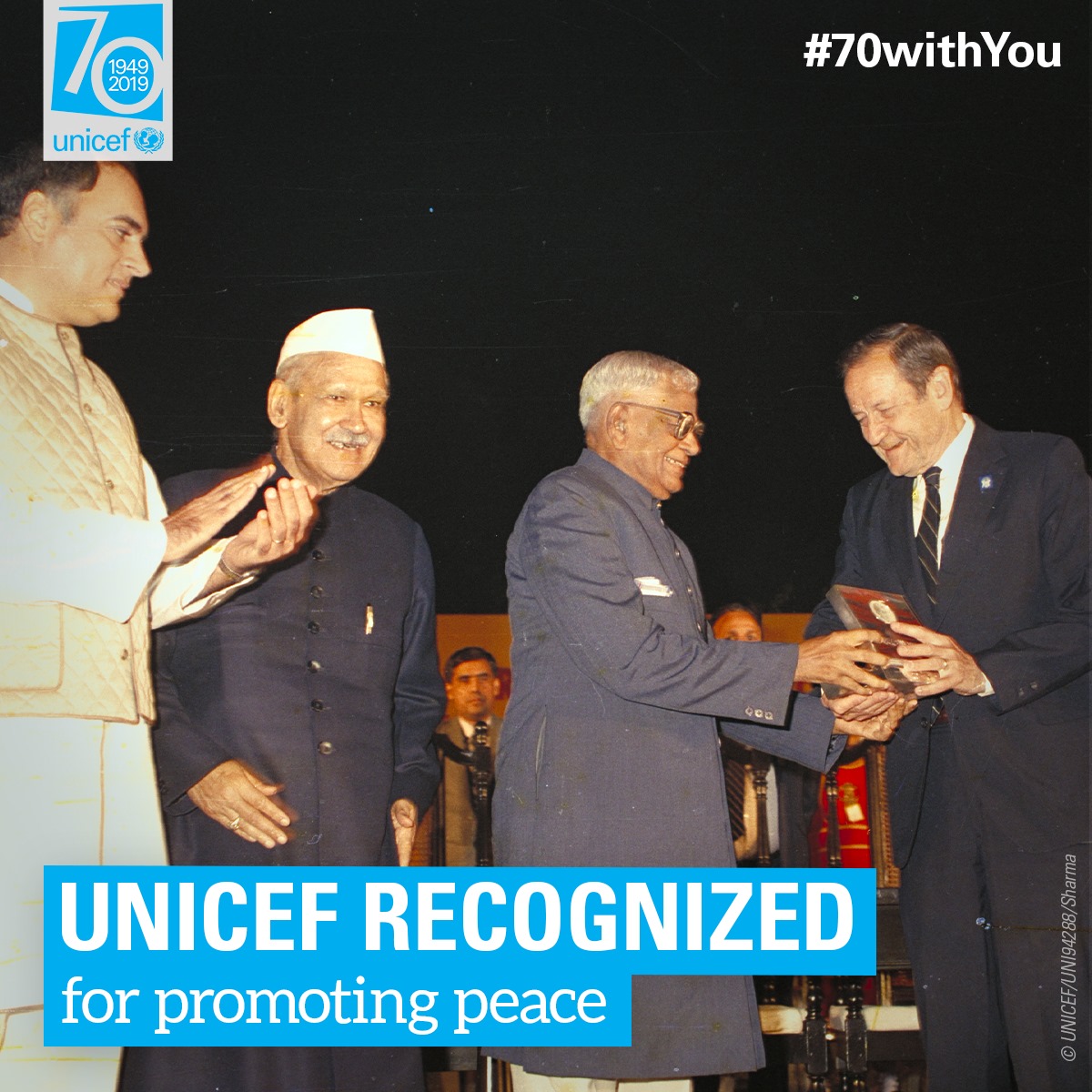
The 1989 Indira Gandhi Prize was awarded to United Nations Children's Fund (UNICEF) "for its outstanding contribution in safeguarding and developing the health of the World's Children, through its expertise and activities extending direct and indirect assistance for the well-being of the future global community."
The 1990 Indira Gandhi Prize was awarded to His Excellency Sam Nujoma, President of Namibia "in recognition of his outstanding contribution in leading the people of Namibia to freedom."
The 1991 Indira Gandhi Prize was awarded to the late Shri Rajiv Gandhi "for his outstanding and innovative contributions to the cause of nuclear disarmament, global peace and economic development."
The 1992 Indira Gandhi Prize was awarded to Dr. Saburo Okita, former Chairman of the Institute for Domestic and International policy studies and former Foreign Minister, Japan "in recognition of his outstanding contributions in the fields of economics, technology and h diplomacy."
The 1993 Indira Gandhi Prize was awarded to His Excellency Dr. Vaclav Havel, President of Czech Republic, "for his outstanding contribution to the defence of human rights and liberties and victory of democracy in his country."
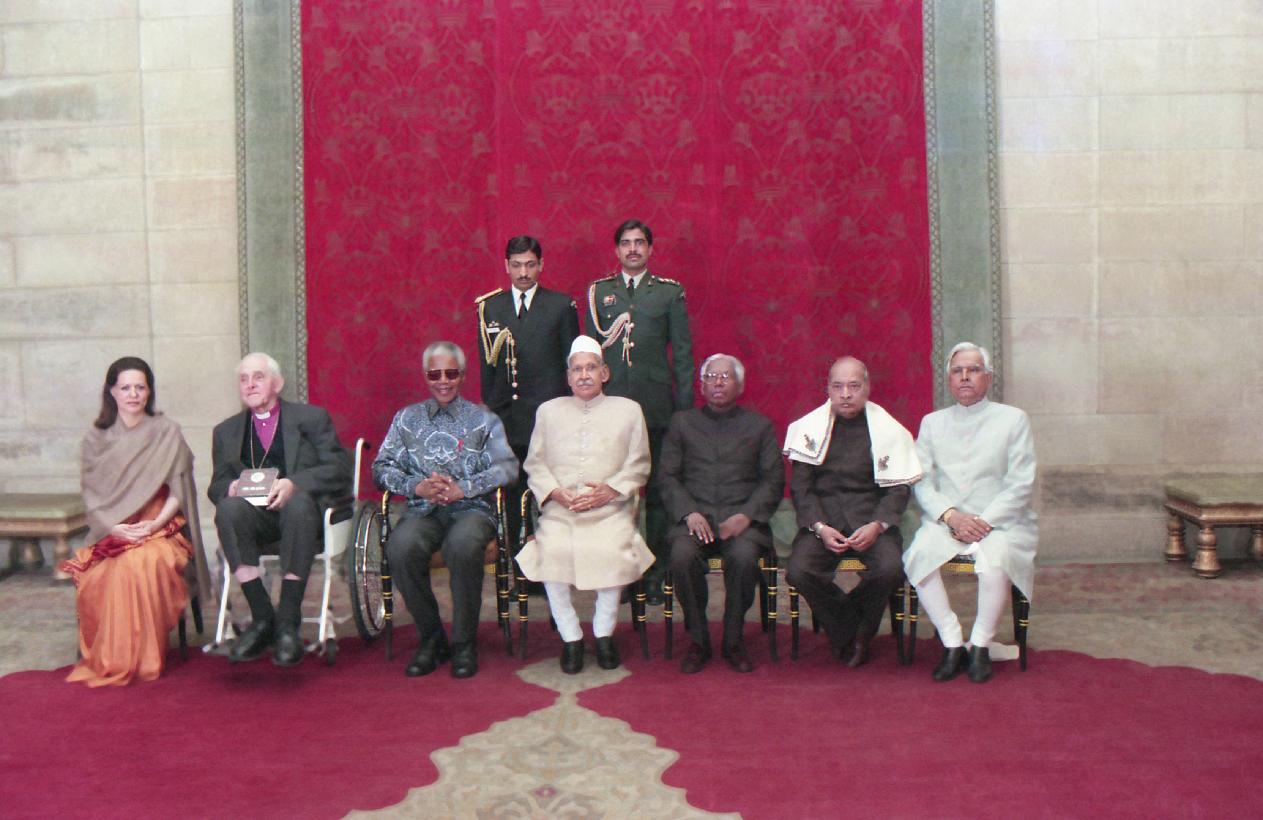
The 1994 Indira Gandhi Prize was awarded to Archbishop Trevor Huddleston "in recognition of his contribution in the field of race relations and in the struggle against apartheid."
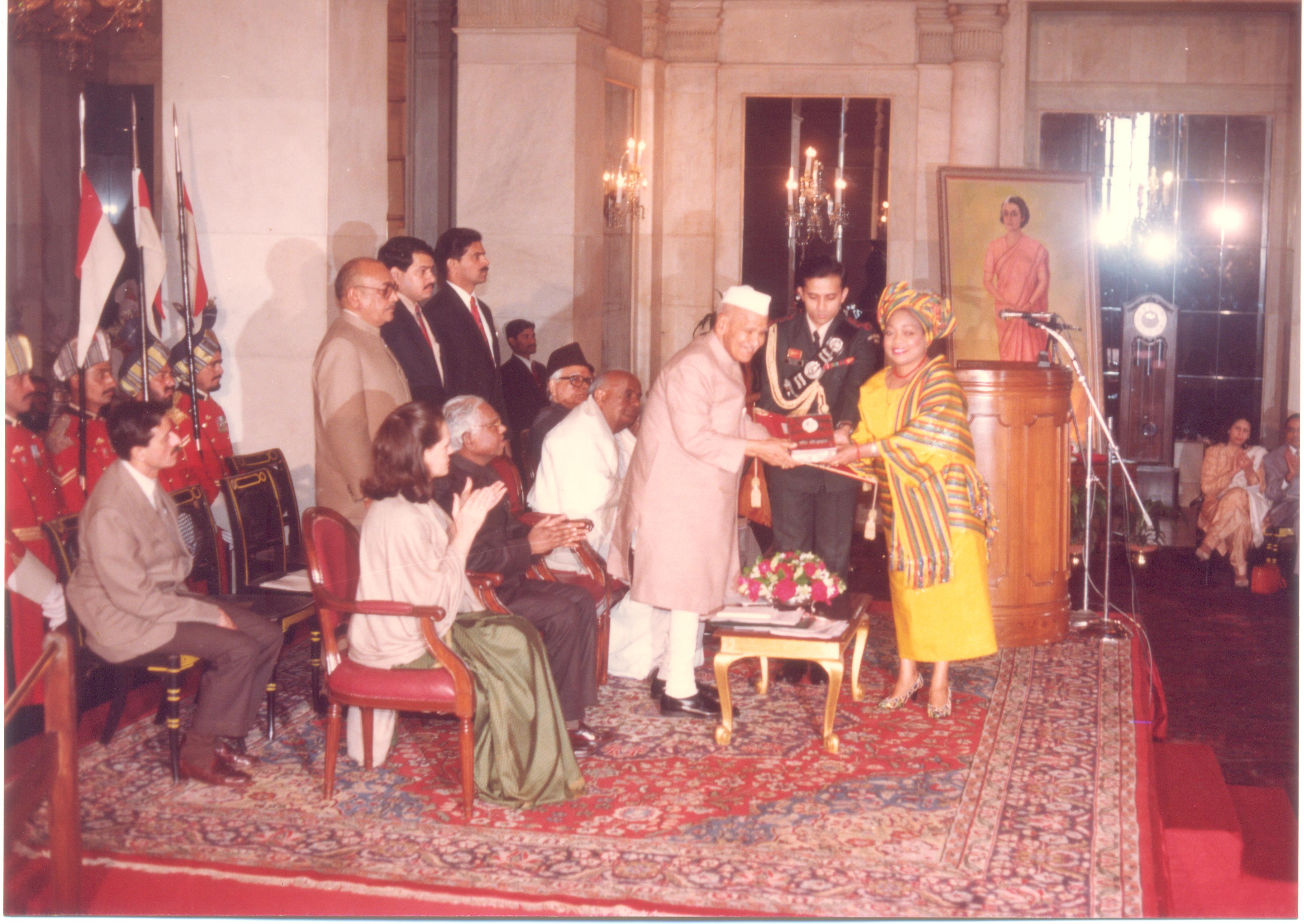
The 1995 Indira Gandhi Prize was awarded to General Olusegun Obasanjo, former Head of State of Nigeria "in recognition of his - contribution towards African democracy and development and for international peace."

The 1996 Indira Gandhi Prize was awarded to Médecins Sans Frontières "for its outstanding work in alleviating human suffering by providing timely and much needed medical aid to people and communities in crisis."
The 1997 Indira Gandhi Prize was awarded to Mr. Jimmy Carter, former President of USA for his outstanding work for peace, disarmament and human rights.

The 1998 Indira Gandhi Prize was awarded to Prof. Muhammad Yunus,Chairman, Grameen Bank, Dhaka, Bangladesh for his unique contribution to the fight against poverty and much more equitable distribution of food resources within families after women have been empowered to control their own destinies, with a Grameen Bank Loan.

The 1999 Indira Gandhi Prize was awarded to Dr. M.S. Swaminathan, Chairman, M.S.S. Research Foundation for his outstanding contribution, in the domain of plant genetics and ensuring food security to hundreds of millions of citizens in the developing world.

The 2000 Indira Gandhi Prize was awarded to Mrs. Mary Robinson, U.N. High Commissioner for Human Rights and Former President, Ireland, in recognition of her signal contribution in the field of human rights, the world over.

The 2001 Indira Gandhi Prize was awarded to Prof. Sadako Ogata, former U.N. High Commissioner for Refugees, for her outstanding devotion to the international refugee problems.

The 2002 Indira Gandhi Prize was awarded to Sir Shridath Ramphal former Secretary General of Commonwealth, for the great services rendered by him for Peace, Disarmament and Development for the last three decades.
The 2003 Indira Gandhi Prize was awarded to the United Nations and H. E. Mr. Kofi Annan, Secretary-General jointly for the great services rendered to promote Peace, Disarmament and Development.

The 2004 Indira Gandhi Prize was awarded to Her Royal Highness Princess Maha Chakri Sirindhorn of Thailand for the great services rendered towards human kind.

The 2005 Indira Gandhi Prize was awarded to H.E. Mr. Hamid Karzai, President of the Islamic Republic of Afghanistan for his efforts to restore peace in Afghanistan.

The 2006 Indira Gandhi Prize was awarded to Prof. Wangari M. Maathai, President of Economics, Social and Cultural Council of African Union for her spending decades in working for poor in slums and under- developed areas and for protection of environment.

The 2007 Indira Gandhi Prize was awarded to Bill and Melinda Gates Foundation for its pioneering and exemplary philanthropic work around the world and in India in health, especially in helping fight disease, illness and poor health conditions in the developing world.
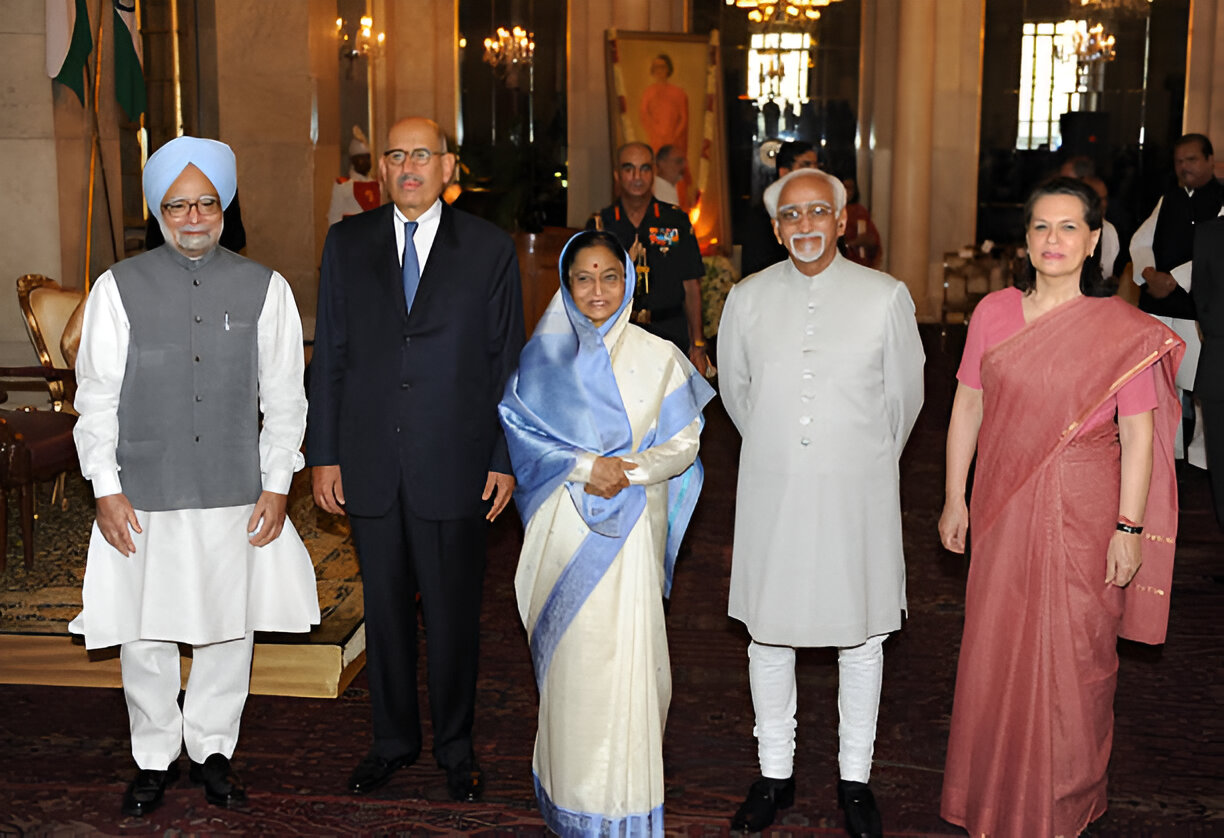
The 2008 Indira Gandhi Prize was awarded to Dr. Mohamed El Baradei "for his impassioned opposition to the use of nuclear energy for military purpose and his steadfast espousal of the peaceful uses of nuclear energy, sustained over many years".
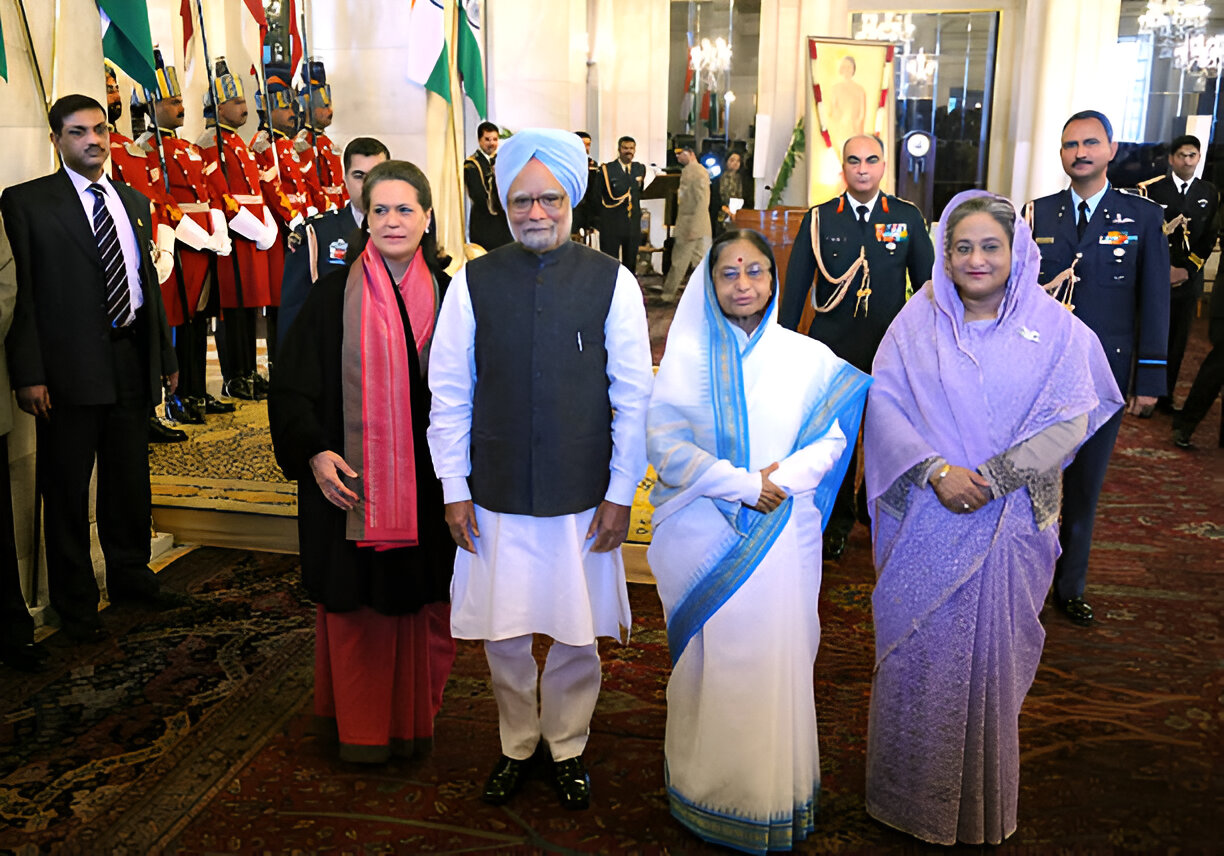
The 2009 Indira Gandhi Prize was awarded to Prime Minister Sheikh Hasina for her outstanding contributions to the promotion of democracy and pluralism, her determined drive to alleviate poverty, secure social and economic justice for her people through inclusive and sustainable developments, and her consistent commitment to peace.

The 2010 Indira Gandhi Prize was awarded to H.E. President Lula of Brazil for his outstanding contribution to the cause of eliminating poverty and promoting inclusive growth in Brazil, for his advocacy of stronger ties among the developing nations and for his singular contribution to the cause of the India-Brazil partnership.

The 2011 Indira Gandhi Prize was awarded to Smt. Ela Bhatt for her lifetime achievements in comprehensively empowering women in India and elsewhere through grassroots entrepreneurship, access to shelter, healthcare, micro-finance, micro-insurance, skills, legal services, collective bargaining power and many other means, and thereby promoting equitable development and peace, following the Gandhian path of self- reliance and non-violence.

The 2012 Indira Gandhi Prize was awarded to H.E. Mrs. Ellen Johnson Sirleaf, President of the Republic of Liberia for serving as an example and an inspiration to many women in Africa and beyond; for ensuring the return of peace, democracy, development, security and order in Liberia; and for her strong interest in the consolidation and improvement of Liberia's relations with India.
The 2013 Indira Gandhi Prize was awarded to H.E. Dr. Angela Merkel, Chancellor of Germany, for her exemplary leadership in Europe and the world during the financial crises, her stewardship of German economic growth and the promotion of global economic stability, her commitment to universal peace and disarmament, and her leadership role in strengthening productive and mutually beneficial relations with India and other developing countries.

The 2014 Indira Gandhi Prize was awarded to the Indian Space Research Organisation (ISRO), in recognition of its path-breaking achievements in space technology culminating in the Mars Orbiter Mission; establishing India as a global leader in space research, its pioneering role in the application of advance technology in promoting broad-based, sustainable social & economic development, and addressing basic needs of our people, particularly in rural and remote areas.

The 2015 Indira Gandhi Prize was awarded to the Office of the United Nations High Commissioner for Refugees, in recognition of its immense contributions in assisting millions of refugees who have fled their homes, for working under difficult circumstances with governments and other agencies to bring about changes to reduce the flow of refugees, for looking to their welfare in a participative manner on a global scale, and for working tirelessly in several places simultaneously to give refugees hope for the future and relief from their suffering.
No award was made for the year 2016 as the Jury, after due process, felt that none of the nominees was in full conformity with the spirit and purpose of the award.

The 2017 Indira Gandhi Prize was awarded to Dr. Manmohan Singh, former Prime Minister, for his leadership of the country and its achievements during the momentous ten years from 2004 to 2014, for his contributions to the cause of economic and social development, for raising India's stature in the world and furthering its relations with its neighbours and leading nations of the world, and for his dedication to the security and well-being of ordinary citizens regardless of their faith, caste, region and language.

The 2018 Indira Gandhi Prize was awarded to the Centre for Science and Environment, New Delhi, for its pioneering work over almost four decades in environmental education and protection, for its steadfast advocacy of measures to combat environmental deterioration, for its success in influencing public policies and programmes that have benefitted social and economic development in India, and for keeping the issue of environmental sustainability at the forefront of national attention and public policy.
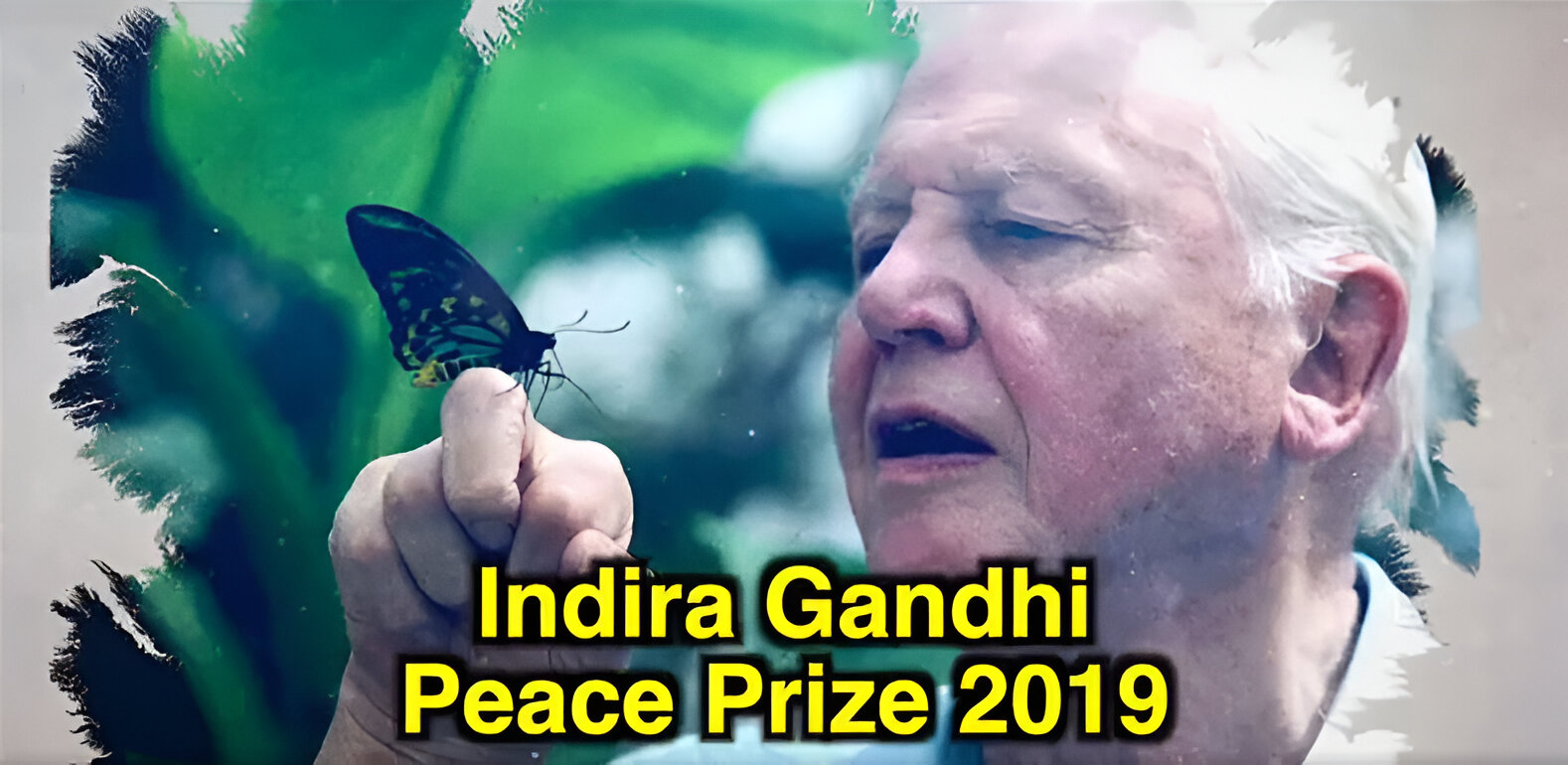
The 2019 Indira Gandhi Prize was awarded to Sir David Attenborough for a lifetime of doing more to reveal the wonders of the natural world to us than perhaps any other individual, for tirelessly working to awaken humankind A to the need to preserve and protect the biodiversity on our planet, to live in a sustainable and harmonious way with all life, and to stop being what he has called "a plague on earth."
Due to the Corona-19 pandemic the Indira Gandhi Prize for the year 2020 could not be awarded.

The 2021 Indira Gandhi Prize was awarded to Pratham for its pioneering work over more than a quarter century in seeking to ensure that every child has access to quality education, for its innovative use of digital technology to deliver education, for its programs to provide skills to young adults, for its regular evaluation of the quality of education, and for its timely response in enabling children to learn during the COVID-19-related school closures.

The 2022 Indira Gandhi Prize was awarded to India's Covid Warriors, the country's medical fraternity, represented by the Indian Medical Association & The Trained Nurses Association of India, for their heroic endeavours, contribution, sacrifices, commitment, compassion, courage, skill and steadfastness while performing their duties selflessly and caring for the millions who suffered during the COVID pandemic in 2020 and 2021.

The 2023 Indira Gandhi Prize was jointly awarded to Mr Daniel Barenboim and Mr Ali Abu Awwad for their outstanding efforts in bringing together the youth and peoples of Israel and the Arab World for a non-violent resolution of the Israel-Palestine conflict by fostering meaningful political and humanitarian dialogue, mutual social and cultural understanding, and peaceful public cooperation through the instruments of music and people's action.
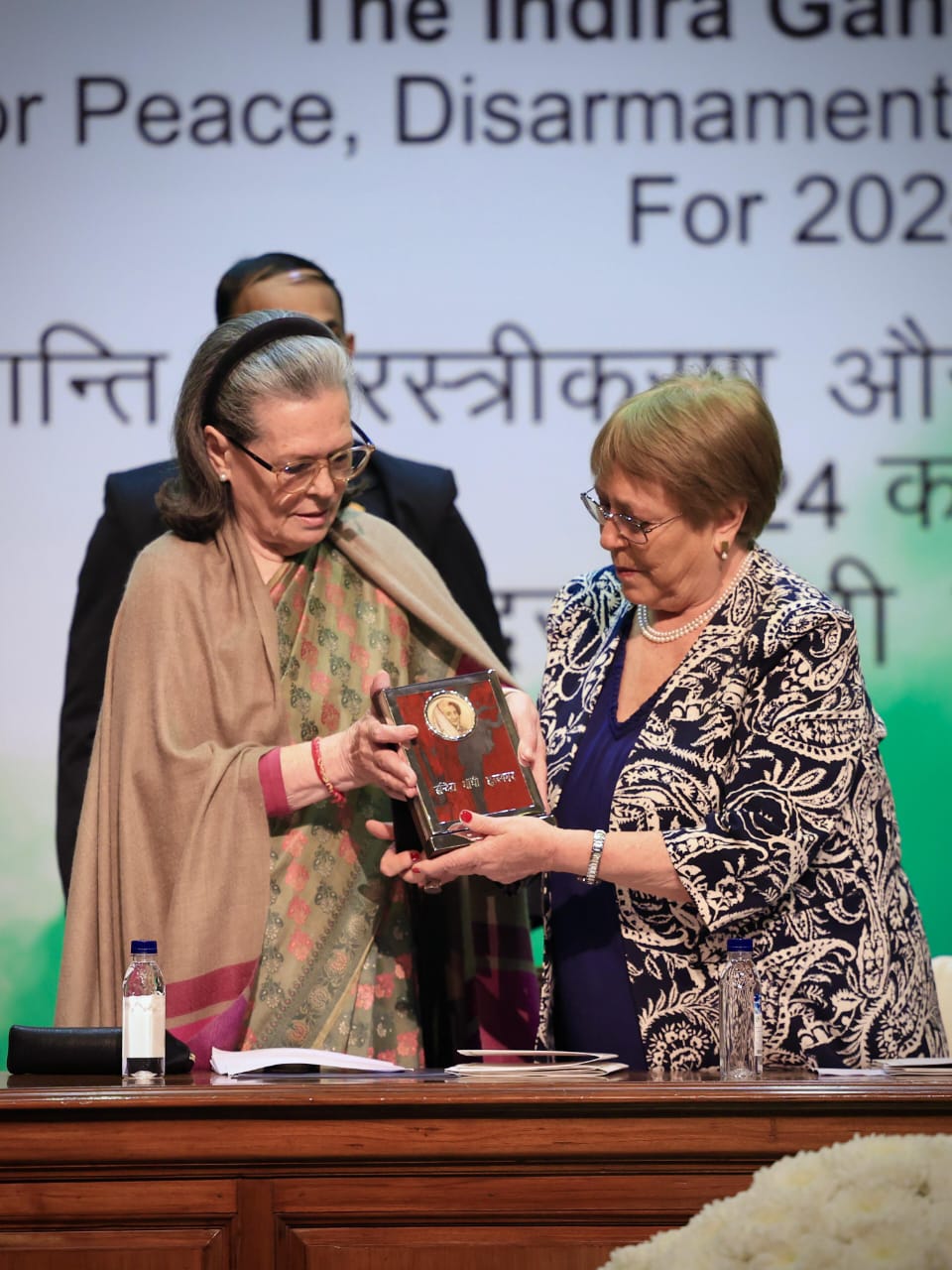
The 2024 Indira Gandhi Prize was awarded to H E Veronica Michelle Bachelet Jeria, former President of Chile, for the example and inspiration that she is to women and men around the world of steadfastly striving for peace, gender equality, human rights, democracy and development in difficult circumstances, and her contributions to India’s relations with Chile.